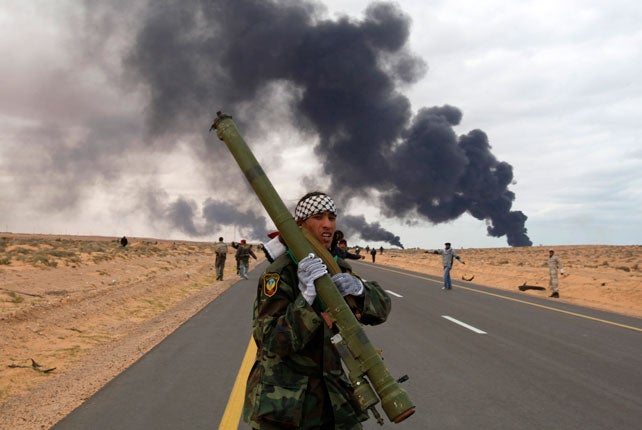Saif Gaddafi tests water with approach to rebels
Middlemen make case for Libyan dictator's son as 'reformer' committed to power-sharing and elections. Kim Sengupta reports

Representatives of one of Muammar Gaddafi's sons are said to have stressed his support for sweeping reforms and democratic elections during informal contacts with Libya's rebel leadership to try to strike a deal to end the conflict.
Diplomatic sources say that supporters acting through middlemen for Saif al-Islam Gaddafi have been stressing his past links with the most senior members of the provisional administration in Benghazi to show his commitment ahead of a possible deal.
The Independent disclosed last week that Saif was proposing an agreement which would limit the role of his father and include opposition figures in a caretaker government.
Elections would be held in the near future and a "reconciliation process" put in place in an attempt to heal the bitter wounds between the regime and its opponents.
Initial approaches have been made by Libyans, mainly living abroad, who say they want to end the strife which has claimed the lives of thousands of fellow citizens.
Those trying to present the case for Saif point to his previous working relationship with Mustafa Mohammed Abdul Jalil, the head of the rebels' national council, and Ali Issawi, its foreign affairs representative.
Mr Jalil, as a senior judge and later the president of the court of appeal, had repeatedly ruled against the regime during trials. While this led to rising criticism among some members of Col Gaddafi's coterie, Saif – who had projected himself as a moderniser – persuaded his father to appoint Mr Jalil as justice minister.
In 2010, when Mr Jalil again asserted his independence by criticising the system in a televised speech and said he was leaving his post, it was Saif, his supporters claim, who ensured his resignation was not accepted.
Following the revolution and Mr Jalil's appointment as the head of the rebel movement, the regime offered a reward of $400,000 for his capture. Saif has apparently claimed that he opposed the offering of the bounty. No evidence has been produced by his supporters to back up this assertion.
Mr Issawi, meanwhile, was twice persuaded to stay on after attempting to resign as the minister for economy, trade and investment. He was subsequently drafted into a "shadow" working committee set up by Saif which, according to a leaked US diplomatic cable, was charged with hammering out specifics of a government reform programme. Mr Issawi was later appointed ambassador to India.
There is little to suggest that Saif al-Islam Gaddafi's campaign to project himself as the man to bring peace to Libya is having any success.
Yesterday the Italian government recognised the rebel administration as the legitimate representative of Libya. The Italian foreign minister, Franco Frattini, declared that "a solution for the future of Libya has a pre-condition, that the Gaddafi regime leaves and is out and that Gaddafi himself and his family leave the country". Mr Frattini was speaking after a meeting with Mr Issawi.
A senior Western diplomatic source said yesterday: "People may say that Saif al-Islam's proposal is dead in the water, but clearly he does not think that.
"There is evidence that some tentative stuff, probes are taking place through third parties. But we continue to face unknowns like what exactly is the position of the old man [Muammar Gaddafi] in all this.
"The regime wants a way out, and the opposition have realised they can't have an easy military victory."
Libya's deputy foreign minister, Abdelati Obeidi, is on a tour of Greece, Turkey and Malta to hold discussions on a possible ceasefire. An official in Athens said: "The Libyan envoy wants to convey that Libya has the intention to negotiate. We don't think that there can be a military solution to the crisis."
The office of the Greek prime minister, George Papandreou, said he had been talking with Turkey about a peace deal, which had at one stage envisaged a transition to representative government in Libya with Saif in charge, as well as Britain and the US. The four countries are all members of the international coalition enforcing the no-fly zone in Libya.
Meanwhile the military impasse on the ground continued yesterday, with the revolutionaries failing, yet again, to break into the oil port of Brega which is being held by the regime. Rebel forces entered the university area of the city yesterday, but fell back after regime troops responded with rocket and mortar fire.
Join our commenting forum
Join thought-provoking conversations, follow other Independent readers and see their replies
Comments